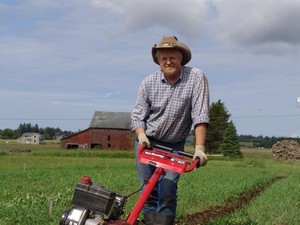04 Jul Sat 2009
Encouraging Gardening vs. Niche Protection
Over the last five years, I have run into several people here in Whatcom Country who seem to think that niche protection is a good idea. To me, this is nonsensical. On the one hand, people pay lip service to incubating new farmers, but on the other hand, they actively seek to discourage small scale participation in direct marketing. On one hand, they want to grow the organic/sustainable market segment each year, but on the other hand, they want to force new farmers to sell at wholesale prices, while doing all the marketing and transport themselves. This ultimately benefits the restaurants and food stores more than the farmer. In short, the farmer is still a price-taker, although the end-users are "kinder, gentler, more touchy-feely" stores and restaurants.
The strait-jacket of commodity wholesale pricing is kept in place by differentiating the consumer and the producer. If a consumer does not really have a clue to the work a farmer does each day, they cannot even begin to grasp how the farmer is subsidizing their cheap food. And let's get real - if I am not making a living on my 3000+ hours of labor I do each year, I am subsidizing everyone to whom I sell food. As I often say to people (only half-jokingly), "Didn't get your bailout or subsidy from the federal government? Go to your local farmer and get your very own local subsidy!" Another point that consumers fail to grasp is how much edible food goes to the compost, or the Food Bank, or sold at a half-rate price to get the shiny, perfect-appearing produce in the co-op or grocery store.
So how do we bridge the gap between the clueless customer and the exploited farmer? One approach is to encourage everyone to do SOME gardening. Once you grow your own arugula in your flower box, you won't give a rip about flea beetle holes. Once you hill your own potatoes, you will not balk at $1.50 a pound for organic spuds. Once you do some weeding on your hands and knees, you will appreciate what it takes to get the produce to your table. Once you try to fit in all the tasks necessary to grow food, you will not be so demanding that farmers take time out of their busy schedule to deliver at YOUR convenience. So . . . if we encourage everyone to grow a little of their own food, we will benefit from the ancillary effect of consumers becoming educated about the REAL cost of food.
For years I have advocated a simple formula: 1) Grow some of your own food. 2) Buy from local farmers. 3) Make choices at the grocery store. You may have noticed that this is quite similar to the Mother Earth News mantra. I did not crib it from them - it is more a case of being on the same page and inventing something independently. However, I do want to give them some credit, because they have been doing an important job for almost 40 years. Sometimes I modify Number 3 to read; Make political choices at the grocery store. In point of fact, when you buy soda pop, you are voting for subsidies to corporate corn farmers and manufacturers of high-fructose corn syrup.
How does this relate to niche protection? Simply put, if you are discouraging small-scale production at your farmers market by charging high stall fees, you effectively freeze out the small producer in favor of the large producer. If your co-op refuses to buy produce from someone unless they are certified organic, you freeze out the politically astute producer who sees the hypocrisy of sucking up to the USDA, as well as the shoestring-budget farmer who simply cannot afford it. Another point about niche protection is that it is based on a false premise, that of zero-sum economics. Zero-sum economics says if someone wins, someone has to lose. This may have some validity if a large portion of market share is challenged. However, since organic/sustainable farming is less than 1% of the food production in the United States, there really is room for plenty of market share for everyone, so niche protection is not necessary. Also, zero-sum economics does not make sense when new wealth is being created, as we are doing every day we grow something from the soil. Thus, there is both a practical and a theoretical flaw in niche protection as it pertains to organic/sustainable farming.
Here's the bottom line. We need to sell more sustainably-grown produce in order to make a living. The easiest way to do this is to encourage more of our customers to grow some of their own food. Then they will appreciate what we are doing for them and will get used to the idea of paying the REAL cost of food. If we cannot break this impasse soon, a lot of us will go out of business, just at the time we need many more sustainable farmers to deal with the transition out of petroleum-based agriculture.

